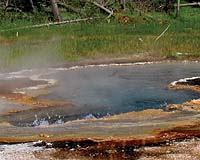| . |  |
. |
Gaborone (AFP) Nov 22, 2009 Tourists love to watch herds of elephants trekking across Botswana's famed Okavango Delta, but nearby farmers watch in dismay when the animals trample their crops, leaving them little to eat. Now those farmers have a new, safe weapon to keep elephants at bay: chilli peppers. Planted around crops, infused into cloth, even made into chilli-dung bombs -- Botswana's farmers are trying myriad uses of tabasco peppers whose potent smell repels elephants from their fields. Government-sponsored training on how to use the chillis to best effect wrapped up last week, and farmers say they're optimistic the peppers will cut down on their crop losses as they begin planting this month. "We are hopeful that this time around we will have better harvest unless if a natural disaster strikes," said Kgagiso Moruti, a 44-year-old villager from Eretshe village in the Okavango district. "The problem has been the elephants, but now that we have been trained on how to deal with them, we have no doubt that we will reap what we sowed." The landlocked southern African country has more than 150,000 elephants, a conservation success story that means the animals increasingly come into conflict with the growing human population. "We have trained villagers in all methods of using chilli peppers to ward off elephants, which have always been a headache to them, especially when it comes to damaging crops," Gaseitsiwe Masunga, chief wildlife biologist for northern Botswana, told AFP. Masunga said the chillis are best planted around the perimeter of maize and sorghum crops, acting as a buffer. If elephants wander in, the smell of the chillis crushed under their feet will drive them away. Chillis can also be mixed with oil and infused into mutton cloth, which is then hung on a fence along the boundary of the field. More dramatically, the peppers can be ground, mixed with dung and molded into bricks that can then be ignited when dry. The smoke emitted from the smouldering dung blocks causes elephants to retreat. "The interesting thing about this programme is that villagers will kill two birds with one stone, as the chilli pepper will also provide a source of income for the communities as after harvest some of it will be sold in both the local and international market," Masunga said. Another farmer, 38-year-old Tapelo Tawana, said if the programme works, his family should have enough food as well as some disposable income from the chilli crop. "We would use the much-needed cash for the upkeep of our families," he said. Similar schemes have paid off in Namibia and Zambia, where small farmers face similar threats from marauding elephants, said Conservation International programme cordinator Anna Songhurst. "It worked in these countries and there is no way it can fail in Botswana as long as villagers follow what they were taught," she said. Share This Article With Planet Earth
Related Links Darwin Today At TerraDaily.com
 Primordial Soup Not Simmering
Primordial Soup Not SimmeringMoffett Field CA (SPX) Nov 19, 2009 The Earth's climate was far cooler - perhaps more than 50 degrees - billions of years ago, which could mean conditions for life all over the planet were more conducive than previously believed, according to a research team that includes a Texas A and M University expert who specializes in geobiology. Mike Tice, a researcher in the Department of Geology and Geophysics at Texas A and M, says ... read more |
|
| The content herein, unless otherwise known to be public domain, are Copyright 1995-2009 - SpaceDaily. AFP and UPI Wire Stories are copyright Agence France-Presse and United Press International. ESA Portal Reports are copyright European Space Agency. All NASA sourced material is public domain. Additional copyrights may apply in whole or part to other bona fide parties. Advertising does not imply endorsement,agreement or approval of any opinions, statements or information provided by SpaceDaily on any Web page published or hosted by SpaceDaily. Privacy Statement |